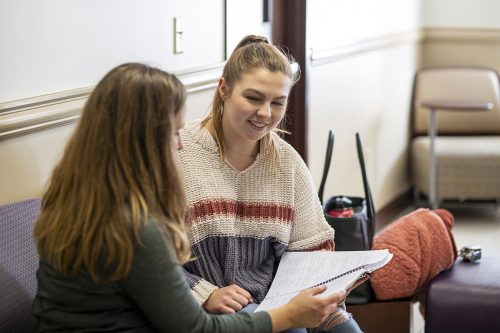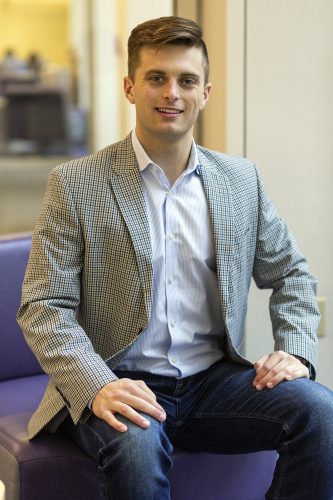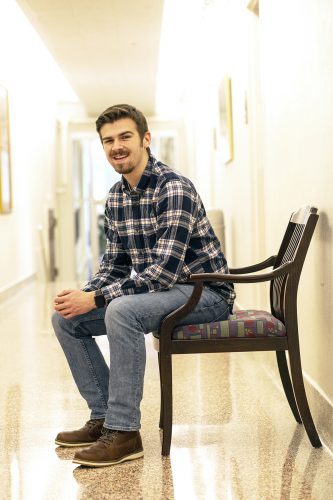
Illustration by Getty Images | ELENABS
Students Design Their Degree Plans
The interdisciplinary inquiry program gives students an opportunity to combine their interests into a single degree.
Most people recognize college majors such as marketing, English, nursing and finance. Not many would presume that someone could earn a degree in the human experience.

Reese Brown talks to adviser Layne Craig, instructor and director of Undergraduate Studies. Brown’s interdisciplinary degree blends courses in philosophy, writing, acting, psychology and sociology. Photo by Mark Graham
Reese Brown wants to travel the world to learn more about humanity’s uniting factors and share her discoveries. Not knowing what major would fit her plans, the sophomore created her own.
When Brown graduates, she will earn a Bachelor of Science in the human experience. Her interdisciplinary degree blends courses in philosophy, writing, acting, psychology and sociology. She chose the classes hoping to gain a greater understanding of humanity.
Brown plans to start her own business as a public speaker, writer and researcher. “I feel like my education and my future are completely within my own two hands,” she said. “I know what I want to do, and I get to do that.”
Brown is one of six students enrolled as an interdisciplinary inquiry major in TCU’s School of Interdisciplinary Studies. The program, launched in 2018, lets students customize degrees by combining academic interests in two or more areas of study.
These students are “clear about their interests, and they’re clear about their path,” said Francyne Huckaby ’96 MEd, associate dean of the School of Interdisciplinary Studies and professor of curriculum studies in the College of Education. “The university structure traditionally doesn’t create those spaces where they want to be.”
TCU is not the only university opening doors for innovative degrees. Since 2005, similar programs have increased by 5 percent in colleges across the country, according to the College Board. The programs vary: Some allow students to combine existing areas of study; others allow students to design a degree plan from scratch. At TCU, students can blend existing course offerings.
“For someone just looking at the constellation of things that they’re interested in, you might go, ‘Those don’t fit together. Those don’t make sense.’ But then when you talk to the student, it makes a whole lot of sense.”
Francyne Huckaby
Cage Sawyers, a junior, was one of the first students approved for an interdisciplinary inquiry major. The process was rigorous, he said. He had to fill out an application, get approval from Huckaby and the Chancellor, and then enlist faculty advisers.
Huckaby said interdisciplinary inquiry majors must plan an entire four-year curriculum. “They’re very intentional and thoughtful about the designing of that degree.”

Cage Sawyers is pursuing an interdisciplinary inquiry degree in public policy with an emphasis on food and drug administration to prepare for law school. Photo by Mark Graham
Sawyers’ degree requirements include courses in political science, economics, business, nutrition and health. He is studying public policy with an emphasis on food and drug administration to prepare for law school. He hopes the combination of academic pursuits will equip him for a career advising food companies on legal matters.
“My friends were questioning me, and my parents were questioning me,” Sawyers said. “But I think at the end of the day, you’re the only one who can see your vision. I had a vision for it, and I knew where it was going to take me.”
Sawyers’ interest in food began at age 15, when he started a potato chip company. “It eventually crashed, but it was the best $15,000 I ever spent because I learned I had a passion for it.”
His latest venture is Numeric Nutrition, a company focused on helping people quantify what they eat to reduce obesity and improve their overall health. Sawyers wants to break into the food tech market by developing software and algorithms that give customers insurance deductibles based on their food purchase histories.
While he originally intended to pursue a career in health care, his interest in business led him to focus on food. “If you just look at America’s food data and nutrition intake, it’s the leading cause of health care issues,” he said. “In my mind, I am in health care by being in food and drug.”
Sawyers said he believes his creative major will set him apart from other law school applicants. “I think people who succeed in an impactful way are specialized, so I wanted to be specialized as early as possible.”
Specialization distinguishes an interdisciplinary inquiry major from a general studies major. The interdisciplinary inquiry program is tailored to each student’s interests, while the general studies degree is for people who have enough credits to graduate but haven’t chosen a major or minor.
Huckaby said this distinction is important. The interdisciplinary inquiry major isn’t intended to give students easier access to a college degree. “This degree cannot supplant or replace or become a back door to any of the other degrees.”
She said her role is to guide both students with unusual degree plans and faculty members who act as their interdisciplinary advisers. “We need to think about the ways in which we need to play as good citizens within the academy and be partners with our colleagues in other departments and other colleges and other schools in ways that support the interest of students.”

Dawson Holder is completing his custom degree combining political science, theatre, leadership and business for a career in entertainment law and entrepreneurship. Photo by Mark Graham
Freshman Dawson Holder said leaning on his academic advisers has been helpful as he designs a degree combining political science, theatre, leadership and business for a career in entertainment law and entrepreneurship. Holder’s professional goal is to become a theatrical producer, ideally on Broadway.
One of Holder’s advisers is Jennifer Engler, associate professor of theatre, who recommended he shift his choice of classes from stage management and directing to script analysis and theatre design. “Even though she’s not a producer herself, she has this background knowledge that has been super helpful,” Holder said.
Engler said the new major is exciting, and she has enjoyed playing a positive role in Holder’s academic career. He “has been a great student to advise because I do believe that he is very in tune with what he needs, not just what he desires, in creating a curriculum that’s going to serve him to become a Broadway producer.”
Holder, like other interdisciplinary inquiry majors, has encountered skeptical reactions from family about forgoing a prepared academic program. His parents also expressed concerns about the freshman changing his mind about his career path. But he’s certain he’s on the right course. “I know I’m going to go to law school, so even if [my ultimate focus] is not exactly entertainment law, it gets my foot in the door.”
Brown also often fields questions about the financial viability of her interdisciplinary major in the human experience. “To have to say, ‘That’s not why I’m doing this. I’m doing it because I’m passionate about it,’ has taught me so much [about] why internal validation is so much more important than external validation.”
Huckaby’s goal is to give students guidance on how to best combine their interests. “They don’t want to sacrifice one interest for another,” she said. “And for someone just looking at the constellation of things that they’re interested in, you might go, ‘Those don’t fit together. Those don’t make sense.’ But then when you talk to the student, it makes a whole lot of sense.”
Huckaby hopes to expand the program, but she knows enrollment is likely to remain small, which helps in catering to the unique interests of each student.
For the students who have declared an interdisciplinary major so far, the unconventional approach to higher education has paved the way for a more passion-driven future.
“This program has given me an inner confidence that I didn’t realize I was missing,” Brown said. “It forced me to put myself out there and continually stand up for my major and the validity of it.”

Your comments are welcome
Comments
Related reading:
Campus News: Alma Matters, Research + Discovery
Faculty from Other Disciplines Use Liberal Arts
How do you merge the liberal arts with your curriculum?
Features
Service-Learning Program Connects Students with Community
Engagement outside the classroom goes beyond volunteering to shape the student experience.
Alumni, Features
Master of Liberal Arts Program Encourages Critical Thinking
The degree gives graduate students a chance to take lifelong learning and leading a step beyond.